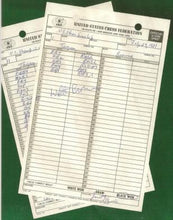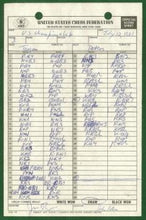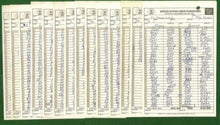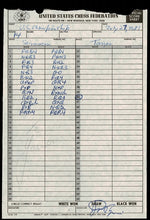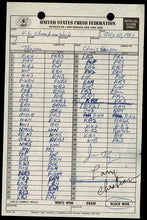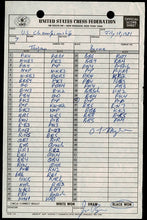
Year: 1981
Publisher: United States Chess Federation
Place: South Bend
Description:
Original hand written scores in James Edward Tarjan's hand of the games in all the rounds and signed by all contestants except for the games with Kavalek, Reshevsky, Shamkovich and Lein. Octavo (8 1/2" x 5 1/2)
The 28th U S Championship and Zonal Qualifier was a hard fought contest which ended with a tie for first place and two co-champions, Grandmasters Walter Browne and Yasser Seirawan. Since the top three finishers automatically qualify for the Zonal, a playoff between Larry Christiansen, Lubomir Kavalek and Sammy Reshevsky, who tied for third would have to be held to determine which one would join Seirawan and Browne. The event got under way on July 9 at the Americana Hotel in South Bend, Indiana. The 9th was the opening ceremonies and players' meeting. The draw for pairing numbers allowed Seirawan a piece of luck, assuring him an extra White over the course of the tournament.
In the first round the game were hard fought, and the only "grandmaster draw" coming from Browne. Browne decided to negotiate an early truce after consuming a great deal of time trying to crack Boris Kogan's solid opening. Sergey Kudrin, a last minute replacement for John Grefe, made his debut in the tournament an exciting one, sacrificing a piece. Sammy Reshevsky grabbed the offer and sent his King on a long hike. After time control Kudrin admitted that his attack had failed and the first decisive game was recorded. John Fedorowicz methodically turned back Leonid Shamkovich's attempt to squeeze an advantage from an English opening. Kavalek tested Lev Alburt's favorite Alekhine's Defense in the tensest struggle of the round and managed to convert an extra pair of pawns into a win. Christiansen chose a Caro-Kann against fellow Californian GM Jim Tarjan and a theoretical battle ensued. Christiansen neutralized Tarjan's slight edge with a series of characteristically aggressive moves and won after Tarjan lost the thread of the game shortly before adjournment. Evans and Lein had the best game of the round, a beautiful strategically effort by the émigré GM who displayed originality and fine control to defeat defending co-champion Larry Evans. Seirawan and Byrne played a Queen's Gambit Declined in which Robert Byrne's hurry to simplify brought him unexpected difficulties; Seirawan reached a Bishop ending and exploited his opponent's weak Kingside to win a pawn. Byrne resisted staunchly and managed to thwart all of White's winning attempts. Joel Benjamin, the youngest entrant, replaced invitee Nick deFirmian, who chose to play in Europe, and his game with Jack Peters was the longest to the round. It was a graduation of sorts for Benjamin, who would have otherwise been defending his U S Junior title. At the end of the first round Reshevsky, Kavalek, Lein, Peters and Christiansen all had one point each.
Round two saw only two draws, Lein and Kogan and Christiansen and Shamkovich. This vicious and exciting session resulted in wins for Reshevsky, Kudrin, Byrne, Seirawan, Alburt and Kavalek. In one of the crispest battles, Alburt's violence paid dividends as he ran Tarjan's King around the board, picking off most of his pawns in the process. At the end of this round Reshevsky and Kavalek each had two points.
Round three had a shocking development. As Fedorowicz awaited the arrival of Evans, a search by the tournament staff disclosed that Evans had checked out of the hotel! Browne bemoaned the fact that he now had two more Blacks than Whites. While Lein and Byrne, Evans' first two opponents, dropped for +1 to and equal score as a result of his departure (Evans' score would have to be erased since he had completed less than half his games). Later in the day Assistant TD Larry Paxton explained that the evening of the second round Evans had notified him that he was feeling ill and this was the reason he had come late for his game with Byrne. The reduction in the number of aspirants to 15 was unfortunate for the championship. In this round, one of the most interesting games was between Shamkovich and Alburt. After the third round Reshevsky and Kavalek each had 2 ½ points.
In round four Benjamin and Brown followed the Reshevsky and Browne game for a short time but the U S Junior champion played more ambitiously for White with a highly unclear and difficult position arising. Benjamin made the most of his chances in the time scramble and put Browne away.
The barn burner was definitely Seirawan and Peters in the fifth round. Seirawan playing the English and Peters trying out the variation that brought Viktor Korchnoi the deciding victory in his latest match with Lev Polugaevsky. As Korchnoi's second, Seirawan was conversant with the possibilities for White and started offering material wholesale, an all-out tactical brawl resulting. Seirawan's style of play was a real departure from earlier days, with an added dimension of tactical ambition that was missing in his not-to-distant past, making him an even more difficult opponent to face. Peters was up to the task, defending with great accuracy and emerging from the complications two pawns up. Seirawan stayed cool and showed his pressure was sufficient, and the game ended in a forced repetition of moves.
In round six Christiansen and Alburt was another Alekhine's Defense and, once again, Christiansen came out looking for an early knockout. He sacrificed a pawn for a quick attack and, when Alburt missed his best chance, Christiansen bashed him flat with a Bishop sacrifice. A fine display of justifiable violence and the highlight of the round.
In round seven Kavalek unveiled an original idea in the English and, despite tough resistance, overcame Fedorowicz in the second session. This win put Kavalek at the head of the pack, passing Reshevsky, who had to watch from the sidelines with a bye. Tarjan and Byrne also began as a theoretical discussion, Byrne defending the Sozin variation of the Narjordf. The game angled toward the well-known Noguieras-Tarjan contest, until Byrne produced a a sizable improvement. Tarjan responded with a blunder, and Byre instantly achieved a winning position and notched his first official victory of the tournament.
Assistant TD Larry Paxton caught everyone's eye when he arrived for round eight in full referee's uniform. black pants and black and white vertical striped shirt. John Fedorowicz game him a flag in case the arbiter felt the need to call any penalties, but the round progressed without any infractions. The hitting was hard, however, and the round was the most dramatic so far, with the frontrunners in great danger on every board. When the eighth round was completed, all the players had finished at least half of their schedule. Despite the pressures of a zonal and the strength of the competition, the players remained fearless and ambitious, with virtually every game a fight without compromise. The standings had Kavalek leading with 5 ½, followed closely by Reshevsky at 5. Christiansen, Seirawan and Kogan were just a half point behind Reshevsky, each with 4 ½. Alburt, Brown and Peters were within striking distance with 4 each. Byrne was by himself with 3 ½ followed by Tarjan, Kudrin and Benjamin with a score of 3. Lein, Fedorowicz and Shamkovich trailed with scores of 2 ½.
Through the generosity of Dr Craig Crenshaw of McLean, Virginia two special prizes in memory of his wife, were announce. GM Arthur Bisguier was designated as the chief judge of these awards, one in the amount of $250 to go to the most interesting game of the event and the second award of $150 to go to most interesting endgame. In round nine Lev Alburt fell victim to a resurgent Walter Browne, who had risen from the ashes and put himself back into contention after an appalling start. Browne left his Hershey bare en prize while sealing, but TD Bill Lukowiak alertly placed it in another envelope. Upon resuming, Browne opened both envelopes, fished off the chocolate and then finished off Alburt for his second consecutive win.
The feature of round ten was the meeting of the tournament leaders. Reshevsky chose the Petroff against Lubomir Kavalek, hoping to simplify and maintain his undefeated status. though Kavalek was not in a peaceful mood, he failed to dent Sammy's position and settled for sharing the pint and the lead.
In round eleven Seirawan joined the leaders by winning his second in a row. Fatigue began to rear its ugly head in round twelve, hardly unexpected in light of the intensity of play. As this harrowing tournament headed into the final rounds, the first signs of fraying nerves became evident. Benjamin, responsible for on of Browne's early losses, played the spoiler again, pushing Christiansen to the brink of elimination.
The spectators in the analysis room benefited from sophisticated commentary in round thirteen when GM Jonathan Speelman stopped to visit on his way home to England. With his back to the wall, Christiansen turned in a smooth performance and defeated Kudrin. At this point, Christiansen had Reshevsky and Kavalek left to play. Seirawan had Tarjan and Lein and Browne had Fedorowicz and a last round bye. The top places were still open to any of the five leaders and Christiansen who two games left against them was the key figure in the drama. In round fourteen Tarjan agreed to a quick draw with Seirawan, who now needed only a draw in the last round to guarantee him a share of the U S Championship title and a spot in the interzonals. Browne managed the White side of a Queen's Gambit with a sure hand and ground out a full point against Fedorowicz to cap a brilliant surge to the top. This victory assured Browne of an interzonal berth and left him a half-point ahead of Seirawan. Christiansen showed his class in the most critical game of the round with a neat win over Reshevsky. Leaders going into the final round were Browne at 9, Seirawan with 8 ½, Kavalek and Christiansen with 8 each and Reshevsky with 7 ½. Browne, who had flown home to California the night before because he had a bye in round fifteen, followed the day's events by phoning the analysis room periodically.
The contenders made an interesting study as they awaited the final round. Christiansen, who could clinch an interzonal spot by beating Kavalek, appeared relaxed and confident. He intended to try hard today, a draw would mean a playoff. So why not try to decide matters now? Reshevsky, who had led from the opening round, needed to win to have a chance at a playoff. He was too nervous to remain by his board pacing and circling the room most of the session. Kavalek and Seirawan arrived a bit late, but both seemed relatively calm. The Alburt Peters game was the only one between non-contenders to deliver a fight. Alburt forced Peters to sacrifice the Exchange, but the game got progressively more difficult for White. At the finish, Peters had to survive a time scramble and a last minute flurry of tactics to gain the win-and a share of the special prize for most interesting game. Lein and Christiansen both managed slight advantages against their opponents, but neither Seirawan nor Kavalek felt like cracking and throwing away weeks of hard work, and both games were drawn. This meant that Seirawan had clinched an interzonal spot and a share of the U S title with Browne; Kavalek and Christiansen had tied for the last qualifying position. In the meantime, Reshevsky had sacrificed a pawn for positional compensation a a queen less middle game and was able to beat Kogan for a shot at the interzonal with a play off with Christiansen and Kavalek.
The Florence Crenshaw Prize of $250 for the most interesting game of the event was shared by Alburt for his seventh-round victory over Benjamin and Jack Peters for his last-round win over Alburt. The prize of $150 for the most interesting end game went to Leonid Shamkovich for his defeat of Kogan in Round ten.
Condition:Closed tears at edges, not affecting score, else a very good set.





